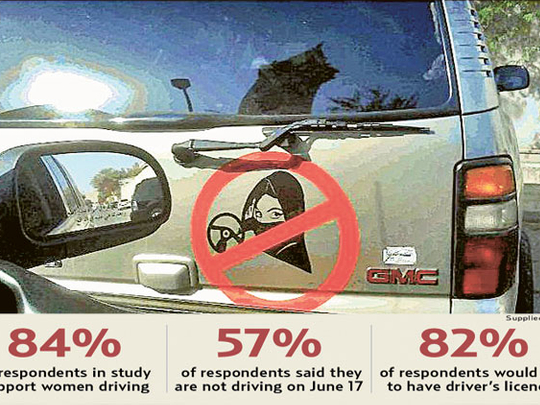
Dubai: A group of Saudi Arabian women have called for women to drive their cars on June 17, in defiance of the social stigma on female drivers in the Kingdom.
The group, "Women 2 Drive", says that it's not against the law for them to drive their own cars — citing the Kingdom's Traffic Law itself — and that it is social stigma holding them back.
"Every lady has something to do in the city, she'll just drive, do her business and come back. So, it's as simple as that. People can't call it a demonstration, we're not going against the law, we're not going against anyone, we're not even demonstrating," Manal Al Sharif, one of the organisers told Gulf News from Saudi Arabia.
Manal said the whole idea of the initiative came from the frustration of 20-year-old King Faisal University, Islamic Studies student Bahia Al Mansour.
Bahia found it increasingly hard to physically attend university and started failing, after difficulties in arranging transport. Public transport is not available.
Consequently, women have to hire private drivers, which Manal said sometimes cost women a lot of money. "Two-thirds of our salaries go to drivers and we keep one-third of our salaries to ourselves. There's no public transport either. You can't walk in the street, you can't drive your own car, there's no public transportation, you have to take a taxi or a private driver," she said.
She said official statistics show there are two million women in the workforce and approximately 750,000 private drivers.
The group has established a social media identity, with a Facebook event drawing more than 4,700 attendees and a Twitter account with more than 2,300 followers (as of May 18).
Illegal
Manal said many women in the Kingdom were under the impression that driving their own cars is illegal. "Women are shocked when they learn there's no law," she said, "there's no problem with women driving."
She said fear prevents women from taking the step.
"Women 2 Drive" conducted an online study, garnering 1,239 respondents.
A total of 84 per cent support women starting to drive on June 17. While 57 per cent said they were not going to drive their own car on the day, 81 per cent of respondents also said that they did not have a driver's licence.
Finally, the majority — 82 per cent — did want to get a driver's licence if they didn't have one.
"Us women we will change — then the society will start accepting. If you wait for change it will never happen," Manal said.
King Abdullah Bin Abdul Aziz told ABC in October 2005 that he supported women's rights. He said with time women would be able to drive, adding that in some rural areas, women drive.
At a press conference in December that year, Crown Prince Sultan Bin Abdul Aziz said of the issue of women driving: "We will study the issue when it is demanded by the fathers, husbands and brothers."
Prince Saud Al Faisal Bin Abdul Aziz, Saudi Foreign Minister, told the UK's Channel 4 in 2007 that it is not the Government that will decide if women should drive.
"Myself, I think they should drive. But [we] are not the ones who decide on that. It has to be the families who decide on that," Prince Saud said. "For us, it is not a political issue, it is a social issue. We believe that this is something for the families to decide...," he said.
In 1990, a fatwa was issued against women driving, after a number of Saudi women drove a convoy of cars through Riyadh in protest of regulations prohibiting them from doing so.
In 2005, Prince Saud told German magazine Der Speigel that the issue was not religious, as nothing in the Quran prohibits women from driving.
"Women 2 Drive" has some support from Saudi men. Manal said her brother is going to give his wife the keys to his car on June 17, until she can buy her own.











